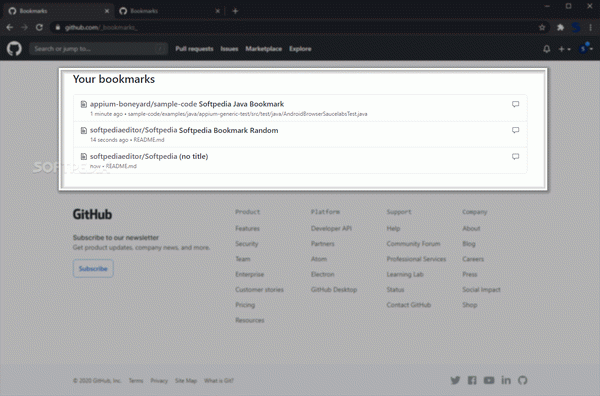Github Bookmarks 0.7.0 Crack With Activator
We've said it before, and we're going to say it again - despite GitHub's popularity and undeniable usefulness, there are a lot of aspects that could be improved.
One of the best ways to improve both GitHub's GUI and overall functionality is to rely on various nifty browser extensions that add neat features to its kit.

Download Github Bookmarks Crack
| Software developer |
Andrew Collins
|
| Grade |
5.0
284
5.0
|
| Downloads count | 1647 |
| File size | < 1 MB |
| Systems | Windows 7, Windows 7 64 bit, Windows 8, Windows 8 64 bit, Windows 10, Windows 10 64 bit |
Github Bookmarks is one such browser extension (for Chrome), and just like its name states, its main purpose is to help you become a bit more organized by allowing you to bookmark your favorite snippets of code from GitHub.
This is incredibly handy for anyone working with a lot of code, regardless if that someone wants to use the code later for other projects, to simply glance over it at a later time, or to actually tweak in order to perfectly fit his or her needs.
One of the best things about Github Bookmarks Serial is just how simple it is. Since it's a Chrome extension, it can be installed in a matter of seconds directly from the Chrome Web Store.
Once present on Chrome, it makes its presence known by adding a new section on GitHub's GUI. You can access all your saved bookmarks directly from the main menu (by clicking your profile), and accessing the Your Bookmarks section.
To save snippets, either select a part of the code and right-click it to select "Add Bookmark" option from Chrome's contextual menu, or use the "Add Bookmark" button right next to the "Raw" and "History" buttons at the top. Of course, bookmarks can be edited to perfectly fit your needs, and you can even add sleek notes in Markdown.
Taking everything into account, it's safe to say that Github Bookmarks is a useful tool that should come in handy to a specific niche of developers who work with recurring code snippets on GitHub on a daily basis. It's easy to use, quite unobtrusive (perfectly fits in GitHub's GUI), and remarkably lightweight.
